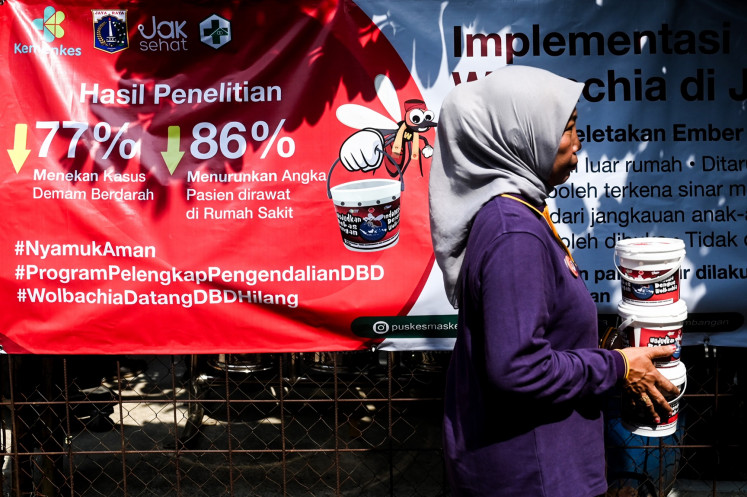Over to you, Hangzhou
Whether Indonesia will repeat or exceed its achievement in Hangzhou remains to be seen.
Change text size
Gift Premium Articles
to Anyone
 Alibaba Executive Chairman, Jack ma during the Closing ceremony of the 18th Asian Games in GBK stadium, senayan, Sunday, September 2, 2018. The 2022 Asian Games will be held in Hangzhou, China. (JP/Seto Wardhana)
Alibaba Executive Chairman, Jack ma during the Closing ceremony of the 18th Asian Games in GBK stadium, senayan, Sunday, September 2, 2018. The 2022 Asian Games will be held in Hangzhou, China. (JP/Seto Wardhana)
F
ew would deny that Indonesia did a great job in making the 18th Asian Games, which concluded on Sunday, a conspicuous success. As the host, with only three years to prepare after Vietnam withdrew from hosting the quadrennial event, Indonesia worked day and night to make sure Jakarta and Palembang were the right places for the continent’s best athletes to excel.
Months before the Games opened in style on Aug. 18, Indonesia had to deal with mounting challenges, ranging from terror attacks in Surabaya, East Java, to major earthquakes on the West Nusa Tenggara island of Lombok, which could have wrought havoc on preparations for the sporting festival.
Kudos to the Indonesian Asian Games Organizing Committee (INASGOC), as well as all related parties, for the very smooth administration of the two-week competition. Of the few problems, the online ticketing fiasco was the most regrettable flaw, although on the bright side this was a testament to the enthusiasm of the public.
The ticketing fiasco forced the Olympic Council of Asia (OCA) to intervene, warning INASGOC to do what it takes to meet the rising demand for tickets. While claiming that the tickets for certain events, such as badminton, were fully booked, empty seats inside the sport arenas were visible.
Spectators complained about the complicated online ticketing system before INASCOG asked blibli.com and tiket.com to take over the ticketing from platform Kiostix.
Indonesia’s achievement as a participant was even more stunning, thanks in part to the enthusiastic support of the home crowd. Loyal supporters flocked to stadiums to cheer on their sporting heroes and heroines, either in victory or agony. Their faith in the national U-23 soccer team, for example, has certainly not waned despite its failure to reach the quarterfinals.
The passionate fans rushed to secure tickets to watch matches in badminton — the second-most popular sport after soccer, where Indonesia secured two gold medals in the men’s doubles and men’s singles.
All the hard work paid off for Indonesia as the national contingent finished fourth overall, the highest since 1962, with a collection of 31 golds, 24 silvers and 43 bronzes. Pencak silat fighters won the lion’s share with 14 golds. Prior to the Games the national team had only expected to garner 16 golds so as to finish among the top 10.
Indonesia’s success aside, the Games underlined the prevailing gap in sports development among Asian nations, as evident in the fact that the continent’s three sports powerhouses won half of the gold medals offered in the quadrennial event, which was participated in by 45 countries.
As the continent’s best athletes head to their respective homes, their focus will soon shift to the 2020 Tokyo Olympics and afterward to the 2022 Asian Games in Hangzhou, China, which will feature between 36 and 40 sports and are slated to be held in cool September.
Whether Indonesia will repeat or exceed its achievement in Hangzhou remains to be seen.
Farewell Jakarta, see you in Hangzhou!









